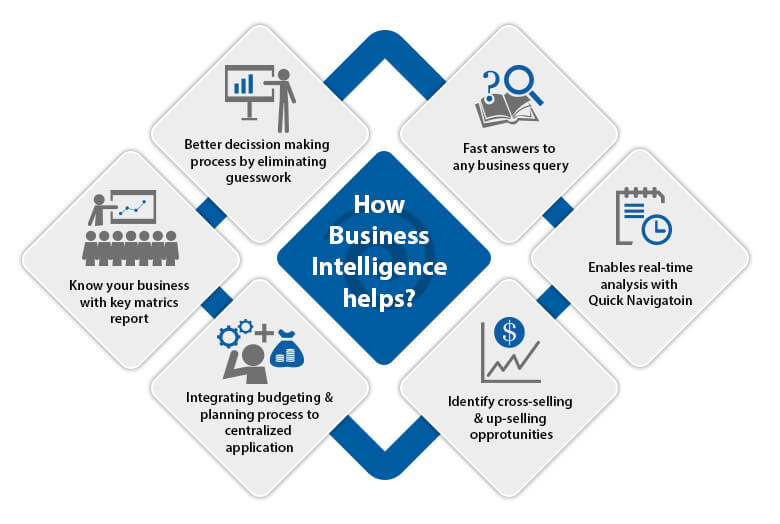Businesses have evolved rapidly over the years; from simple models, industries have transformed into multilayered, complex structures because of technology. Currently, we are witnessing yet another evolution as Artificial Intelligence (AI) takes the front seat and becomes an integral part of every leading company. According to IBM, roughly 35% of businesses have adopted AI. But what is this technology? Artificial intelligence is basically the science that makes machines think like humans and perform the same functions – only better! So, it combines machine learning and deep learning, using ample amounts of data to make intelligent decisions.
Hence, the question arises: how is AI helping to reshape businesses? Let’s find out:
How is Artificial Intelligence Useful for Businesses?
Businesses use AI in various ways. All these AI tools aim to push for growth and provide innovative solutions to everyday problems. While AI has diverse uses, in a nutshell, here’s what it does.
- It allows businesses to get more productive through automation.
- It improves customer service and speed.
- It provides valuable insights into consumer decision-making.
- And it unlocks new opportunities for products and services.
No matter what your business strategy is, you can use AI to boost business success. So, if you’re eager to include AI in your business model, you need to use a reliable company that can provide you with the services you need. To get you started, here’s a website you can look into and familiarize yourself with AI: https://www.sap.com/products/artificial-intelligence/what-is-artificial-intelligence.html; this leading enterprise will provide you with the technology you need for decision-making, enhanced data processing, and analytics. The relevant AI tools present here can be used for predictive analysis and automation and improve consumer interaction, resulting in a more extensive customer base.

A Deeper Look into AI and The Business World
AI and the commerce sector are deeply entangled with each other. AI provides businesses with the boost they need to take their corporations higher. Here’s how:
1. Enables Prototyping
Prototyping is an experimental process in which design teams try to capture their ideas in a tangible form and gauge whether they suit consumers. A company at a time creates various prototypes before settling on a final product. In such cases, AI and machine learning are extremely useful in designing, developing, and fixing prototypes. AI tools can also provide suggestions for complex challenges that may arise while creating a prototype.
The algorithms in AI can swiftly analyze copious data and enable designers to make smart decisions about the product design and gauge whether it’s functional. It saves you from the trouble of redesigning and helps you see if there are any oversights. AI does this through machine learning. The machine learning algorithms analyze how successful your past designs were and use the experience to improve your future prototypes. Then, when the time to turn a prototyped product into a test unit, assembling robots can be put to work to produce early iterations without the same time or cost constraints as in the past.
2. Better Security
Businesses cannot afford to lose data. According to a study by Verizon, data loss can cost from a few thousand dollars to more than $15 million. Small-scale businesses cannot cope with this loss and may have to declare bankruptcy. Hence, securing your data is paramount, and AI can help you there. Using an AI tool, you can make your network safer by letting it filter malware, spam, and phishing emails before they can infiltrate your system. For example, some companies provide customizable email filters that can block out malicious and suspicious activity in inbound and outbound emails. These platforms also come with an inbuilt dashboard that informs your company’s security teams on the health of your infrastructure.
3. Brings Innovation to Common Problems
Businesses don’t just create products, but they are also responsible for providing solutions to problems that impact the economy. Digitization has allowed firms to identify these issues and find innovative ways to deal with them. AI has empowered experts to solve complex problems by enabling businesses to conduct wide-scale research, use machine learning to find the core of the problem, and use predictive analysis to propose a solution. This vast data collection further transforms AI, providing specific solutions that enable companies to build better services.
In fact, in certain companies, engineers and manufacturers are designing robotics that can help the recycling industry. These robotics use AI to increase the efficiency of recycling operations. AI is also trained to recognize objects and decide what kind of recycling it can be used for. So, no matter what material you put in, the company’s technology can comprehend color, shape, texture, logos, and material, digitizing the object and helping you recycle.
4. Streamlines The Supply Chain

Businesses need a steady supply chain. They need to ensure their inventory is ripe at all times and that products are ready for consumers. AI systems can impact the supply chain. They improve the accuracy and agility by which the inventory manages itself. While there are many widespread applications of AI within the supply chain department, some are particularly common. These include inventory-taking drones, driverless warehouse carts, and anomaly detection software. The mechanism is simple. AI-powered analytics uses your historical data and market trends to evaluate how much stock you need. It also goes through the inventory of all your connected franchises to dispatch the correct item to the right location. This reduces the cost of overstocking and restocks all your products on time. Furthermore, you can also use AI to analyze traffic patterns and climate conditions to pick the optimal route for delivering your goods. Machine learning provides route optimization that reduces the cost of fuel and transport and ensures you can get to your destination on time.
5. Simple Customer Support
Numerous businesses have already implemented chatbots into their customer service. Chatbots make customer support much more efficient. They provide answers and recommendations faster than the average human. Chatbots can also answer common challenges consumers face while purchasing and are available around the clock. As a result, you don’t need to appoint a customer representative and can let Chatbots handle the operations for you. Most consumers also feel much more comfortable with the AI chat tool. It can pick up their query, complete suggestions, and already has a list ready using the customer’s past purchasing habits.
Final Thoughts
Businesses today cannot function without AI. This tool has empowered companies to become more efficient and effective. For any enterprise, the bottom line is to ensure they can grow their consumer base and produce top-quality products; both are made possible through AI. Artificial Intelligence has many uses, including boosting consumer support, helping in designing new products, fixing prototypes, and establishing a solid relationship between the company and its clients. So, as a business, identify what the company needs, think about how automation will benefit you, and procure the relevant AI tool to help your firm.

